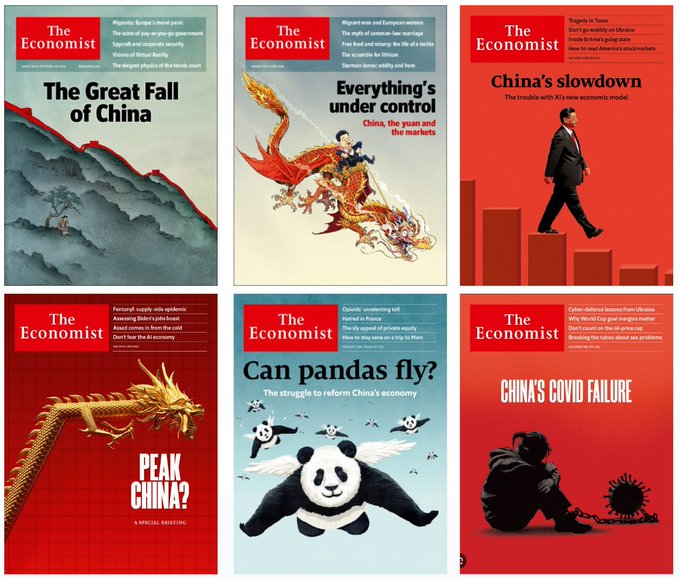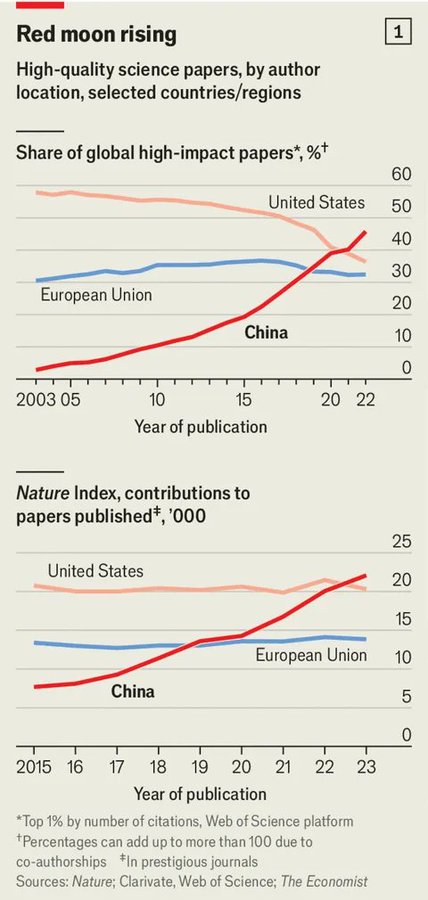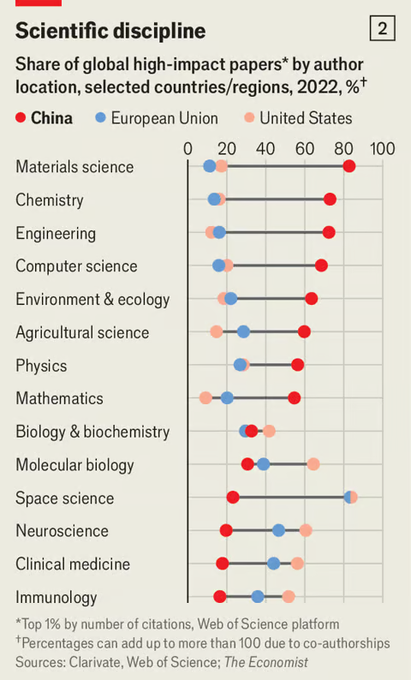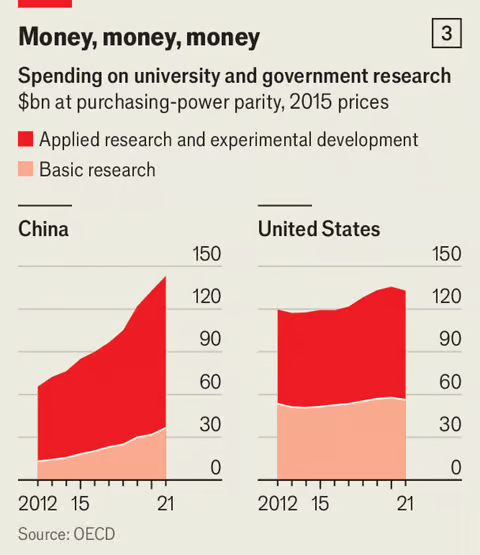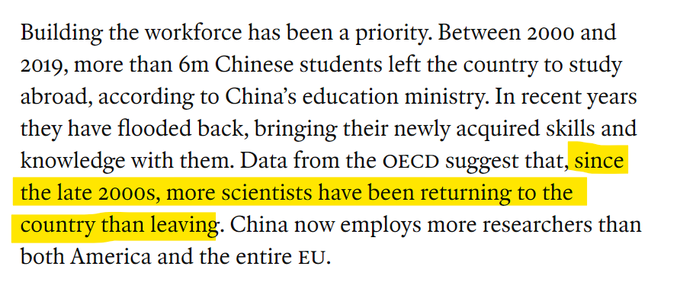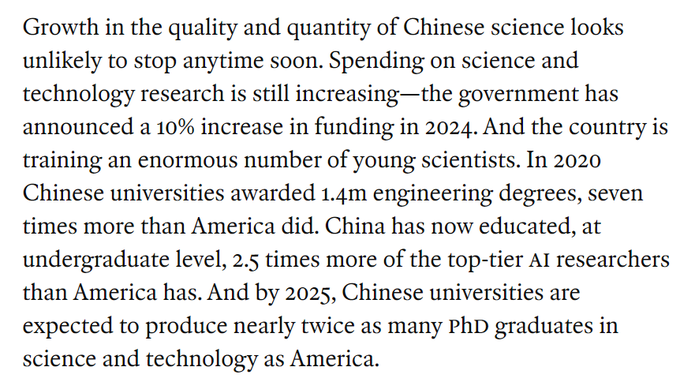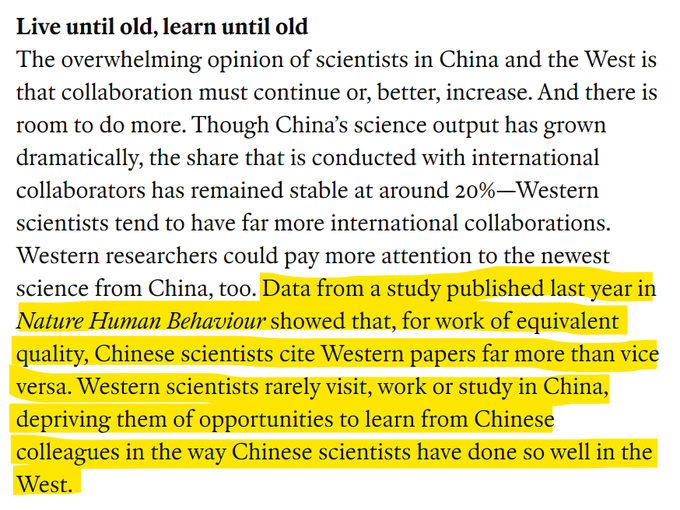Resilience: the capacity to withstand or to recover quickly from difficulties; toughnes.
Israeli army murder a Palestinian
youth in his home
The bulldozer desecrates his body.
Look how the corpse hangs on the jaws of the digger
This is in the town of Qabatiya in the West Bank
Hamas are not in the West Bank
Fascism. Terrorism. Evil.
Bideoa: https://x.com/i/status/1801333728213369186
oooooo
The grandson of one of the signatories of Israel’s 1948 Declaration of Independence: “I don’t think Israel’s objective is to defeat the Palestinian resistance.
I think Israel’s objective is to kill as many Palestinians as possible…it’s extermination. It’s genocide.”
Bideoa: https://x.com/i/status/1801218675669655746
oooooo
“We’ll return” A pro-Palestine mural spotted in the Colombian capital, Bogota
oooooo
The Economist: “China has become a scientific superpower” Rare for me – maybe even unprecedented – to praise the Economist but this might be the seminal article on the current status of China’s scientific might.
Let’s take a look
oooooo
Firstly, surprising that The Economist would publish this, given how much they’ve pushed the “China collapse” narrative over the years, and how negative they’ve always been about the country.
Maybe they figured that at some point they could only get away with so much…
So what proves that China has now become the world’s foremost scientific power? Firstly, China has now overtaken both the US and entire EU in number of high-impact scientific papers produced each year, including in the Nature Index which is virtually impossible to game.
oooooo
China’s rise in that dimension was insanely fast: “In 2003 America produced 20 times more of these high-impact papers than China… By 2013 America produced about 4 times the number of top papers and, in the most recent release of data, which examines papers from 2022 China
surpassed both America and the entire European Union”
oooooo
Looking at Chinese universities in terms of scientific research output, “there are now six Chinese universities or institutions in the world top ten [according to the Leiden Ranking], and seven according to the Nature Index”
Again, this was done in a single generation.
oooooo
Looking by discipline, China leads 8 out of the 14 main scientific disciplines, including maths and physics.
In some disciplines like materials science, chemistry or engineering, it completely dominates the discipline with 70% to 80% of all high-impact papers published.
China also now spends more money on university and government research that the US, and spending is growing at an awesome rate: “China’s spending on R&D has grown 16-fold since 2000” and doesn’t show any sign of stopping, when US spending has all but stalled.
Looking at people and education, two crucial points:
1) Contrary to popular belief, China is a net importer of scientists: “since the late 2000s, more scientists have been returning to the country than leaving”
ooo
2) China is training way more scientists. For instance in 2020 Chinese universities awarded 7 times (!) more engineering degrees than the US. And by 2025, Chinese universities are expected to produce nearly twice as many phd graduates in science and technology as the US.
The Economist points out – correctly – that it’s high time the West takes notice of this new reality. Today Western scientists cite Chinese peers far less than vice-versa, and very few Western scientists visit, work or study in China, to learn from China in the way Chinese
scientists have done in the West.
oooooo
The paper concludes with a citation of S. Marginson, a professor of higher education at Oxford University: “I think it’d be very unwise to call limits on the Chinese miracle, because it has had no limits up until now.”
A sharp contrast to The Economist editorial line to date
oooooo
My personal take is that it’s crystal clear that China is now the foremost scientific power in the world, and it’s only the beginning.
We often hear the expression “x is not 10 foot tall”. Well, China actually IS 10 foot tall: they’ve achieved all of this in one generation and they’re literally just getting started. In July they’ll hold the Third Plenum to decide on the country’s direction for the next 10 years and everything points to the fact that they’ll double down on science and technology. This means we might be looking at a future where China’s scientific prowess exceeds the rest of the world, combined.
So at this stage the West has 2 options.
The “Qing dynasty” option, rooted in arrogance, fear and paranoia where it seeks to decouple and insulate itself from Chinese science and technology, which is what China’s Qing dynasty did at a time when the West’s scientific and technological might exceeded the rest of the world combined. How did that work out? China rapidly fell behind and thereby followed its “century of humiliation”. Worryingly, this seems to be the current path followed by the US…
The “swallow our pride” option, where the West instead of demonizing China, refusing to understand it and learn from it instead does enormous work on itself to understand the country with intellectual honesty and to keep pace with its progress. For instance it is absolutely amazing to me that there are more people learning Korean and Japanese than Chinese (https://blog.duolingo.com/2023-duolingo-language-report/), which makes just about zero sense… Also amazing is the fact that the US State Department currently has level 3 “reconsider travel” advisory on China (https://travel.state.gov/content/travel/en/traveladvisories/traveladvisories/china-travel-advisory.html), literally telling its citizens not to travel there, even though it’s far and away one of the safest countries in the world to travel to (when you look at facts instead of propaganda)…
I strongly suspect they’ll do the former, and that this will be one of the most consequential disastrous decisions of this century. But there’s still time to come to our senses…
Venezuela at the UN: “We remind the United States that it is not the world’s police, that it does not have authority, legitimacy or morality to give an opinion or promulgate measures that seek only to meddle in internal affairs of sovereign countries.”
Bideoa: https://x.com/i/status/1801404545282576623
oooooo
We should never be forgiven for what we let Israel do to the children of Gaza.
Bideoa: https://x.com/i/status/1801377961582428593
oooooo
She Was a Paramedic. She Helped Save Lives. Israel Killed Her in South Lebanon Tonight.
This is the man controlling both Netanyahu and Joe Biden… he is also. the man that will never allow a ceasefire agreement…
Ben-Gvir is an Iraqi settler who lives in the occupied West Bank…
Gvir was behind the assassination of Israeli Prime Minister Yitzhak Rabin who tried to bring peace to Palestinians through the Oslo Accords
Gvir proudly brandishes the hood ornament from the Cadillac that was bombed to kill Rabin…
Ben-Gvir was known to have a portrait in his living room of Baruch Goldstein, a Jewish extremist and Israeli-American mass murderer who massacred 29 Palestinian Muslim worshipers and wounded 125 others in the 1994…
BEN-GVIR IS A TERRORIST…
oooooo
Candace Owen: Piers Morgan is afraid to critique Israel.
Bideoa: https://x.com/i/status/1801202030398062875
oooooo
@tobararbulu # mmt@tobararbulu
6 hBRICS no to UN: What Next? https://youtu.be/5w6nNDI6gjM?si=qKc9-K_ZJu5XnwKy
youtube.com
BRICS no to UN: What Next?
Bideoa: https://www.youtube.com/watch?v=5w6nNDI6gjM
BRICS nations and other countries from the Global South have voiced their disappointment with the United Nations for several reasons, mainly due to the dominance of Western nations in key international institutions and decision-making processes. These countries believe that the current structure of the UN does not adequately represent their interests and influences. In response, there have been numerous suggestions for extensive reforms or even a complete replacement of the UN, aiming to create a more balanced and representative global governance system. This video will explore these proposed reforms and the reasons behind them.
Transkripzioa:
0:03
the brics Nations along with other
0:05
countries from the global South have
0:07
voiced their disappointment with the
0:08
United Nations for several reasons
0:10
mainly due to the dominance of Western
0:12
nations in key International
0:14
institutions and decision-making
0:16
processes these countries believe that
0:18
the current structure of the UN does not
0:20
adequately represent their interests and
0:23
influences in response there have been
0:25
numerous suggestions for extensive
0:27
reforms or even a complete replacement
0:30
of the UN aiming to create a more
0:32
balanced and representative Global
0:34
governance system today this video will
0:36
explore these proposed reforms and the
0:38
reasons behind
0:40
them representation and influence the
0:44
brics Nations argue that the current
0:46
Global governance structures including
0:48
the UN the World Bank and the
0:50
international monetary fund IMF are
0:53
dominated by Western Powers which do not
0:55
adequately represent the interest and
0:57
voices of emerging economies and
0:59
developing countries these nations feel
1:02
that their economic growth and
1:03
geopolitical importance are not
1:05
reflected in these institutions
1:07
governance and
1:09
policies Western bias and double
1:12
standards there’s a perception among
1:14
brics nations that the UN and other
1:16
International bodies are biased towards
1:18
Western countries this sentiment is
1:20
particularly strong regarding human
1:22
rights issues where bricks countries
1:24
like China and Russia have been
1:26
frequently criticized while they believe
1:28
similar issues in Western countries
1:30
receive less attention this perceived
1:32
double standard Fosters distrust and
1:35
dissatisfaction with the
1:38
UN many Global South countries including
1:41
brics members feel that Western Le
1:43
institutions impose stringent conditions
1:45
on financial assistance and development
1:47
Aid which can hinder their economic
1:49
growth and sovereignty they argue that
1:51
these conditions are often more
1:52
favorable to Western economic and
1:55
political interests rather than
1:57
addressing the actual developmental
1:58
needs of recipient
2:00
countries brics Nations argue that the
2:03
current Global Financial and political
2:05
systems including the UN the World Bank
2:07
and the IMF are skewed in favor of
2:10
Western countries these institutions are
2:12
seen as not adequately addressing the
2:14
interests of emerging economies and
2:16
developing countries despite their
2:18
growing economic
2:22
clout the ongoing geopolitical rivalries
2:25
such as those involving Russia and China
2:27
further exacerbate the situation actions
2:30
taken by Western countries like
2:32
sanctions or political pressure are seen
2:34
as attempts to curb the influence of
2:36
brics Nations on the global stage this
2:39
adversarial stance contributes to the
2:41
dissatisfaction with how International
2:43
institutions including the UN are
2:45
perceived to be operating overall bricks
2:48
nations are pushing for a more
2:49
multi-polar World Order where their
2:51
interests and contributions are better
2:53
acknowledged and respected this includes
2:55
efforts to establish parallel
2:57
institutions and mechanisms that can
2:59
provide alternative to the current
3:00
Western dominated global system brics
3:03
nations are increasingly seeking to
3:05
create parallel institutions and
3:07
mechanisms to reduce their dependency on
3:09
Western Le Financial systems this
3:11
includes the establishment of the new
3:13
development bank and discussions about
3:15
creating a bricks currency to challenge
3:17
the dominance of the US dollar in
3:19
international trade the expansion of
3:21
bricks to include countries like Saudi
3:23
Arabia UAE Egypt and Ethiopia is also
3:27
part of a broader strategy to increase
3:29
their Collective influence on the global
3:31
stage this expanded group now accounts
3:34
for a significant share of the world’s
3:35
GDP and population further strengthening
3:38
their case for greater representation
3:40
and influence in global
3:43
institutions let’s take a quick pause
3:46
could you do us a favor if you enjoy our
3:48
content please hit the like button to
3:50
help even more leave your thoughts and
3:51
feedback in the comments your engagement
3:53
helps us grow thank
3:56
you the United Nations un for in 1945
4:01
was created to promote Global Peace and
4:03
Security in response to the horrors of
4:05
World War II and to correct the failures
4:07
of the League of Nations the un’s goal
4:10
was to offer a platform for Nations to
4:12
discuss and resolve Global problems
4:14
together it has two main bodies the
4:17
general assembly and the security
4:19
Council which serve different functions
4:21
the general assembly is a democratic
4:23
Forum where every member country has one
4:25
vote and IT addresses a wide range of
4:27
issues including security but budgets
4:30
and overseeing un operations although
4:32
its resolutions are mostly non-binding
4:35
it can act on peace and security if the
4:37
security Council fails to do so under
4:39
the uniting for peace resolution the
4:42
security Council a smaller body with 15
4:44
members includes five permanent ones the
4:47
United States the United Kingdom France
4:50
China and Russia these permanent members
4:53
have veto power reflecting the global
4:56
power structure after World War II this
4:58
setup is meant to ensure sure these key
5:00
countries could protect their strategic
5:02
interests however this Arrangement has
5:04
been criticized for reducing the
5:06
council’s effectiveness especially when
5:08
permanent members use their veto to
5:10
block actions making it hard for the
5:12
council to respond quickly to Global
5:14
crises The veto power held by these
5:17
nuclear armed countries often leads to a
5:19
deadlock as seen in recent issues like
5:21
the ceasefire in Gaza this system
5:24
frequently appears to prioritize the
5:26
interests of a few powerful Nations Over
5:28
The Wider Global good the effectiveness
5:30
of the un’s main bodies is often
5:32
criticized the general assembly though
5:34
representing all member nations
5:36
struggles to influence significant
5:38
Global actions due to its resolutions
5:40
being non-binding meanwhile the security
5:43
Council which can make binding decisions
5:44
is frequently hindered by geopolitical
5:47
tensions especially among its permanent
5:49
members with veto power despite these
5:51
issues the un’s specialized agencies
5:54
like the World Health Organization who
5:56
and UNESCO play Vital roles in
5:58
addressing Global health education and
6:00
cultural preservation however the
6:03
security council’s failure to keep up
6:05
with changing Global Dynamics has
6:06
significantly damaged The un’s
6:08
credibility and Effectiveness AS Global
6:11
challenges like climate change and cyber
6:13
security grow the un’s foundational
6:15
purpose is more important than ever
6:17
unfortunately the likelihood of
6:19
meaningful reform is low mainly because
6:21
any changes require the agreement of the
6:23
security council’s permanent members who
6:25
have little incentive to change a system
6:27
that benefits them
6:30
if the UN were dissolved many believe a
6:33
new organization would need to be
6:34
created to handle Global issues this is
6:37
because there is still a strong need for
6:39
a place where countries can work
6:40
together for peace and security critics
6:42
of the UN say its structure especially
6:45
the veto power of the five permanent
6:47
Security Council Members is outdated and
6:50
doesn’t fit today’s world experts have
6:52
suggested different ideas to improve
6:54
Global governance one idea is to form a
6:57
new group called The Democratic Nation
6:59
DN this group would have a two-part
7:02
legislative system to better represent
7:04
countries with different populations and
7:06
levels of influence another suggestion
7:08
is to strengthen Regional groups like
7:09
The G20 these groups could help address
7:12
Global problems more quickly and
7:14
effectively than the UN which often
7:16
struggles with bureaucracy the idea is
7:18
that smaller groups could act faster and
7:20
more decisively however there are
7:22
concerns about this approach smaller
7:25
groups like The G20 don’t represent all
7:27
countries especially smaller or less
7:29
powerful ones this goes against the idea
7:32
of equal representation that the UN
7:34
stands for strengthening Regional groups
7:36
might lead to a fragmented International
7:38
System with overlapping rules and
7:40
authorities making Global cooperation
7:42
more complicated relying on smaller
7:45
groups could weaken the broader
7:46
International System reducing the
7:48
influence of smaller States in global
7:50
decisions Effectiveness in global issues
7:53
while smaller groups might be more agile
7:55
they may not have the reach to address
7:57
Global issues like climate change or
7:58
pandemics which need coordinated action
8:01
from all countries there is a worry that
8:03
groups like The G20 driven by the
8:05
interests of wealthy countries might
8:07
ignore the needs of poorer Nations
8:09
worsening Global inequalities these
8:12
points suggest that while we need more
8:14
effective Global governance it’s also
8:16
important to ensure all countries have a
8:18
say the debate continues on how best to
8:21
achieve this balance in the end we need
8:24
a system that is more representative and
8:26
capable of handling the complex issues
8:28
of today’s world
8:32
that’s all for this video thank you for
8:34
watching this video we sincerely
8:36
appreciate you joining us today if our
8:38
content resonated with you or sparked
8:40
inspiration please consider expressing
8:42
your support by liking it and
8:44
subscribing to stay connected with our
8:46
community your support holds immense
8:48
value for us you can watch another video
8:50
of our Channel which is now on the
8:51
screen
oooooo
@tobararbulu # mmt@tobararbulu
Congressman Spills The Tea on AIPAC https://youtu.be/HG9NavF_O6o?si=8Vuo2KlECj2nG0HW
Congressman Spills The Tea on AIPAC
Bideoa: https://www.youtube.com/watch?v=HG9NavF_O6o
U.S. Representative Thomas Massie spilled the tea on AIPAC’s low blows against him during his election. Ana Kasparian discusses on The Young Turks. Your Support is Crucial to the Show: https://tyt.com/team
Transkripzioa:
0:00
Representative Thomas Massie, who’s been the only Republican
0:04
willing to speak out against Israel, who’s been the only Republican
0:08
who has consistently voted against sending more military aid to Israel, had to sit
0:12
down and interview with Tucker Carlson.
0:14
– And it was kind of amazing. – I’m not against Israel.
0:18
I’ve never voted to sanction Israel.
0:21
I’ve never said anything particularly, you know, critical of Israel.
0:26
You know, other than, for instance, right now they’re bombing.
0:30
They’ve killed 1% of the civilian population in Gaza.
0:33
That’s concerning to me.
0:34
I vote my conscience, which they won’t tolerate.
0:39
So they ran with their 500 and 1C4 before they had a superPAC.
0:44
They they were running educational advocacy ads against me
0:49
saying that, you know, I’m bad on Israel this election cycle.
0:52
They spent $400,000 against me, $90,000 last fall, running TV ads in my
0:57
district and Facebook ads and whatnot.
0:59
They’ve called you a bigot, and they call you an anti-Semite and say you’re a hater
1:05
and try to destroy your character.
1:09
During a recent sit down interview between Tucker Carlson and Kentucky’s
1:13
libertarian congressman Thomas Massie, we learned quite a bit about how AIPAC,
1:19
the lobby that basically represents Israel, how much sway they have
1:26
over Republican politicians in particular.
1:29
Now, Thomas Massie experienced quite a bit first hand, and I think the insight
1:34
that he provided in the context of this interview was worthy of a listen.
1:39
And honestly, something that I give him props for.
1:42
Even as a member of the Republican Party who has a bunch of stances
1:48
I totally disagree with.
1:49
You know, he’s against reproductive rights for women.
1:53
He’s he’s a he’s not the kind of politician that I would typically support,
1:58
but he does appear to be incredibly principled
2:01
when it comes to the issue of foreign aid to various countries, including Israel.
2:08
And he consistently voted against offering Israel more military aid
2:12
during this current war.
2:13
And that led to a lot of attacks against him.
2:15
But he persisted. And again, I give him credit for that.
2:19
During this interview, he even went so far as to say that every Republican lawmaker
2:23
has an AIPAC babysitter, which you definitely want to stick around for.
2:27
We’re going to get to that clip in just a moment.
2:29
But first, let’s actually start at the beginning with what Massie experienced
2:33
as he was running for Congress.
2:36
Massie says that his first run with AIPAC was in 2012, when they actually had
2:41
this strange request for him.
2:44
They, they tried to get me to write a white paper as a candidate,
2:48
for instance, for Congress.
2:49
They almost get on what? On Israel like, and I wouldn’t do it.
2:55
And they said, why?
2:56
And I’m like, I don’t do homework for lobbyists, right?
2:59
I, I didn’t I didn’t like writing term papers at college.
3:03
– I’m not writing one for you. – What did they say?
3:07
They said, oh, well, here, just copy Rand Paul’s term paper and put your name on it.
3:12
We’ll accept that.
3:13
And I’m like, no, I’m still not cribbing somebody else’s homework to do homework.
3:17
I’m not turning in my homework for you. And what?
3:23
You’re laughing. But you know what?
3:25
I bet, I may be the only Republican in Congress who hasn’t done homework
3:29
for AIPAC, and it’s just what it is.
3:32
It’s conditioning.
3:33
They want you to do something very simple and benign,
3:36
and, you know, for them, they don’t really they don’t really grade your term paper.
3:40
They just want to know that you’ll do something for them.
3:42
And if you’ll do something for them as a candidate, you’re more
3:44
likely to do something for them as as a congressman when you get in there.
3:49
Pausing here to deliver some honest truth, as we do in our news coverage as well.
3:53
TYT is facing challenges, guys, as the entire industry is.
3:57
You know, who could make the difference? You.
3:58
If you hit the join button below, it’s going to make all the difference
4:01
and keep us in business.
4:02
We appreciate you. Thank you.
4:04
How insane is that?
4:06
It’s essentially testing to see if lawmakers are willing to take orders
4:11
from this incredibly powerful lobby that represents the interests
4:15
of a foreign government.
4:18
And to his credit, he’s like, nah, I’m not.
4:21
I’m not going to I’m not going to do a little report for you.
4:23
I’m not interested.
4:24
And when AIPAC says it’s okay, you don’t have to spend any time
4:28
working on anything.
4:29
Just take someone else’s report and pass it off as your own.
4:32
He wasn’t willing to do that either, and he recognized what that task
4:37
was really meant for, what it was supposed to communicate to the lobby.
4:43
And again, to his credit, he’s like, no, I’m not going to do that.
4:47
And we’re actually kind of lucky because AIPAC wasn’t paying,
4:52
according to him, wasn’t paying very close attention to his race.
4:55
They didn’t think he was going to win a congressional seat.
4:58
And so when they got involved in trying to destroy his campaign,
5:02
it was already too late.
5:03
He had garnered quite a bit of support from constituents in his district.
5:06
Now, since Massey was unwilling to play ball with AIPAC, they did retaliate.
5:12
So let’s just hear some details about that.
5:16
How did they respond to that?
5:18
Well, they kind of got in my race a little too late there in the beginning.
5:23
And because it was hard to tell that I was actually going to win.
5:26
And when they saw I was going to win, that’s when they tried to get me
5:28
to do the term paper.
5:30
They didn’t have a political action committee at the time.
5:34
They couldn’t spend hundreds of thousands or millions of dollars
5:37
against me at that time.
5:38
It was just sort of like a whisper campaign to try to, hey, don’t
5:42
vote for him, blah, blah, blah, blah.
5:44
Why?
5:46
Because at that point, they sensed I wouldn’t do what they wanted when I.
5:49
– What did they whisper against you? – What were they saying about you?
5:52
Well, they would do it through, for instance, churches, evangelical churches.
5:56
They’ve got an organization called Christians United for Israel
6:00
where they sort of co-opted evangelicals.
6:03
People think it’s a grassroots movement in Kentucky.
6:06
It’s actually a top down movement from AIPAC,
6:09
so that people who aren’t even Jewish will feel like they’ve got to support Israel.
6:15
You know, no matter what.
6:19
I thought that that comment was really important because it gives you an inside
6:25
look into the tactics that AIPAC deploys.
6:29
You know, they’re obviously well funded, well organized.
6:33
They’ve got a ton of people, especially if they can have a babysitter
6:37
available for every Republican lawmaker, which we’ll get to in a moment.
6:42
But it just kind of gives you that sneak peek, that inside look into
6:46
the inner workings of these relationships that lobbyists forged
6:51
with our elected lawmakers and how, you know, they’ll use carrots.
6:55
The carrots come in the form of cold, hard cash for their campaigns,
6:59
but they also use sticks, including showing up to evangelical churches
7:04
to propagandize the parishioners there.
7:07
That is insane.
7:09
And I just want you all to understand how brave it is to not cave
7:15
to that kind of pressure as a politician.
7:18
I say that because almost every politician in our federal government
7:23
does cave to that kind of pressure.
7:25
Very few politicians resist, and that’s why I want to give Marcy credit here,
7:30
even though he is in disagreement with me on a whole host of political issues.
7:36
You have to give credit where credit is due.
7:38
And in this case, I give him credit for actually being principled
7:42
on what his beliefs are and doing his best to stay true to those principles,
7:47
which is an incredibly difficult thing to do as a United States politician.
7:52
Now, finally, here’s Marcy talking about the AIPAC babysitters
7:55
that each congressional Republican has.
7:58
– Everybody but me has an AIPAC person. – What does that mean, an AIPAC person?
8:02
It’s like your babysitter, your AIPAC babysitter who,
8:06
is always talking to you for AIPAC.
8:09
They’re probably a constituent in your district, but they are, you know,
8:14
firmly embedded in AIPAC.
8:16
And every member has something like this.
8:19
Every I don’t know how it works on the Democrat side.
8:22
But that’s how it works on the Republican side.
8:25
And when they and when they come to DC, you go have lunch with them
8:29
and they’ve got your cell number and you have conversations with them.
8:33
– So I’ve had like. – That’s absolutely crazy.
8:36
I’ve had four members of Congress say, I’ll talk to my AIPAC person.
8:41
And it’s literally what we call them, my AIPAC guy.
8:44
I’ll talk to my AIPAC guy and see if I can get him to,
8:47
you know, dial those ads back.
8:52
So the AIPAC babysitter can, you know, jump in and help you out.
8:56
If you need help with your congressional campaign, whether it be with funding or,
9:01
with the types of ads that are airing.
9:03
And in this case, you know, Marcy was offered help by other lawmakers
9:07
who had a, AIPAC babysitters, this whole notion that they might be able to jump
9:13
in and help, you know, lessen the blow of some of the terrible ads that AIPAC
9:17
was putting out against Thomas Massie.
9:19
But how embarrassing is it to have an AIPAC babysitter?
9:24
I mean, that’s a great way of putting it. I’m glad that he used that terminology.
9:27
These are elected lawmakers who are supposed to serve the best
9:31
interests of the American people, of the constituents within their districts.
9:34
And rather than doing that.
9:38
They feel that they need to be loyal to these lobbyists.
9:42
And I can understand why.
9:44
I mean, a lot of these politicians are narcissistic cowards.
9:48
They’re not in in their positions.
9:50
They’re not in elected office because they genuinely care
9:54
about being public servants.
9:56
They’re there to enrich themselves.
9:58
They’re there to trade individual stocks based on insider info, something
10:03
that Martha Stewart went to prison for.
10:05
But our elected lawmakers won’t go to prison for.
10:08
They’re there to, spend money on luxury hotels in D.C.
10:13
Even even if they have homes in D.C.
10:15
Already, and then expense that to the American taxpayers
10:19
without having to provide a damn receipt because they literally passed a law
10:22
so they don’t have to provide a receipt, and Americans end up paying for their
10:27
luxury trips and their luxury goods.
10:29
It’s absolutely ludicrous.
10:31
That’s what the majority of lawmakers are in Congress for.
10:34
That’s why Congress has an insanely low approval rating.
10:37
Because Americans aren’t stupid. I don’t care what you identify as.
10:41
I don’t care if you’re a Democrat or Republican.
10:43
Everyone is so bitter and so angry with how little government works for us.
10:49
And what Thomas Massie is disclosing to the public in this interview
10:53
is the reason why these are the forces behind closed doors that basically suck up
11:00
all of the attention from our lawmakers, as Americans are dying from neglect
11:08
over all these various issues, whether it be the drug overdose epidemic,
11:13
whether it be the housing crisis, I mean, the list goes on and on and on.
11:17
Whether it be the migrant crisis.
11:18
We haven’t had immigration reform in this country for decades, many decades.
11:22
And so it’s just incredible that he was willing to say this
11:27
and to say it so openly, honestly, without
11:31
any throat clearing, without any caveats.
11:34
He’s just calling it like it is.
11:37
And powerful lobbies usually garner pretty incredible results.
11:42
And I want to show you what those results look like.
11:44
So let’s put this chart up.
11:45
This is a chart, using data from the federal government
11:49
showing which countries receive the most in US foreign aid since World War two.
11:55
So this is between 1946 and 2024.
11:59
And by far Israel is the largest recipient of US foreign aid
12:03
to the tune of $337 billion.
12:08
Coming in at second, you have Egypt at $198.9 billion.
12:14
But again, clearly, Israel is the top recipient here,
12:18
and that’s not by accident.
12:21
So the final thing I’ll say about this is.
12:24
One thing that I think unites voters on both sides of the political aisle
12:29
is the frustration that they feel about the swamp, about the corruption.
12:35
– And so to have these two right. – Wingers have.
12:40
This frank conversation about the influence of the Israel lobby, think
12:44
about the audience they’re speaking to.
12:47
It is important for that audience to hear this.
12:50
This is something that, you know, the left, generally speaking, has been
12:54
screaming from the rooftops about.
12:56
But I am so happy that these kinds of conversations
12:59
are also being had on the right.
13:00
I think that’s valuable, and we should give credit where credit is due.
13:04
Doesn’t mean that we have to support Thomas Massie as a politician that would
13:09
represent us in our districts, right?
13:11
I mean, obviously he has views that I disagree with,
13:14
but when he’s right, he’s right.
13:16
And on this issue, not only is he right, he’s also incredibly brave for doing what
13:21
he’s doing, knowing that he’s going to face ad campaigns and attacks from AIPAC.
13:28
I mean, you certainly more brave than John Fetterman,
13:31
a senator who ran as a progressive and can’t stop himself from kissing
13:35
Netanyahu’s ass day in and day out. I mean, totally pathetic.
13:38
And he, like, puffs his chest up as if he’s like some
13:41
incredibly courageous lawmaker.
13:44
You’re not courageous. You don’t have to.
13:45
You don’t have to worry about reelection for several years.
13:48
Okay? So you’re running your mouth.
13:49
We’ll see how it plays out when he’s running for reelection.
13:52
Thanks for watching.
13:53
If you become a member, you get to watch all this ad free.
13:56
Except for, of course, this ad still hits the join button below.
oooooo



